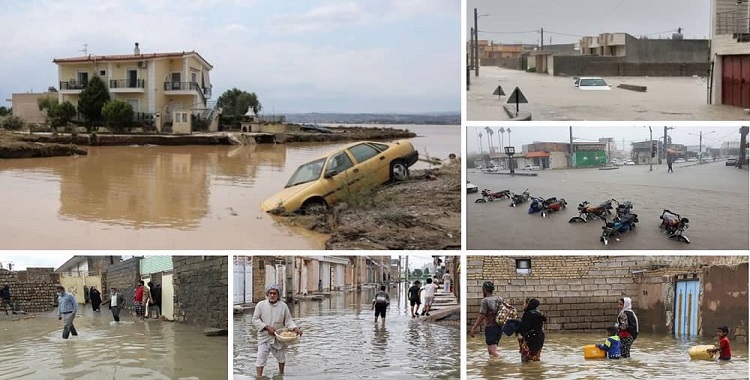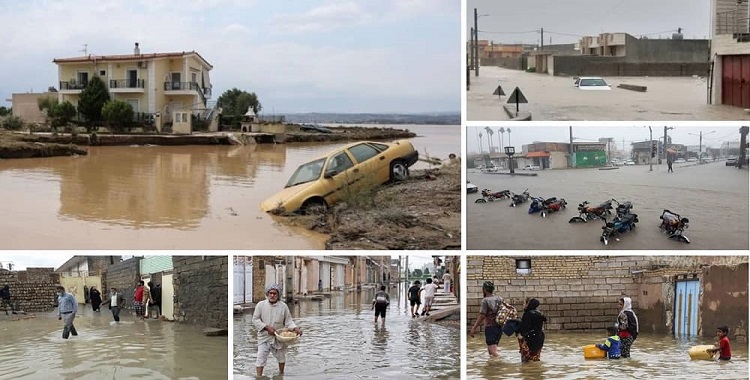Flood Crisis in Iran: People Protest Regime’s Inaction as More Provinces Damaged

Written by
Hamideh Taati
Floods in southern cities of Iran – December 2020
Reports from Iran indicate that floods have spread across southwest Iran, including many parts of Bushehr province. With floods destroying their houses, many people in different southwestern Iranian provinces gathered in protest to the regime’s inaction.
Fearing people’s intensifying anger, the regime’s governor of Khuzestan province suspended the mayor of the city of Sarbandar after protests by locals over the regime’s inaction.
“Due to the recent rains, eight provinces, including Khuzestan, were flooded, and in 15 cities, water entered the houses. Ahvaz, Mahshahr, and Sarbandar ports were the most flooded on the roads and houses, and many people’s houses were submerged,” said Ali Khodadadi, head of the Khuzestan Red Crescent.
Reports from Iran indicate that floods and torrential rains shut down all companies in the Mahshahr Port Petrochemical Special Economic Zone in southwest Iran.
Flood Crisis in Iran: People Protest Regime’s Inaction as More Provinces Damaged – December 2020
The heavy rainfall in the past two weeks in Khuzestan province created flash floods. Floods have destroyed the houses of locals. Yet, the regime’s officials have not taken any serious action to help the victims.
Many of the cities in southwest Iran lack sewage disposal systems and surface water conduction canals. Therefore, the water has risen on the street, and sewage entered people’s houses in Ahvaz, Karun, Bandar Imam, and Mahshahr in Khuzestan province.
“No management has been done to protect the river route since 2018. Also, for 20 years, the [regime] has not taken any action to improve Ahvaz’s sewage system, and they are traditionally directed to the Karun River. Due to the increasing amount of sediments, rivers’ capacity decreases, and with the least rainfall, this water enters directly into sewers and pipes,” said Masoud Kanani, an environmentalist.
Was the flood crisis preventable?
The regime could have prevented floods. But, the regime’s Revolutionary Guards (IRGC) have been carrying out systematic deforestation of the Iranian frosts, building unscientific and unnecessary dams, and converting flood routes and dry riverbeds for urban development without proper drainage infrastructure for further looting Iran’s natural resources. In other words, the regime increased the severity of the floods.
In 2019, a devastating flood in Khuzestan province took the lives of hundreds. Yet, the regime did not repair the infrastructures in this province.
“Khuzestan province has been experiencing unprecedented rains for the last two years, which are sometimes accompanied by floods and river floods. In late winter and early spring, after Nowruz [the Persian new year] in 2018, the influx of river water into the villages of Khuzestan, especially in Susangard, caused a lot of damage to the people. The municipality has encroached on the territory of Karun River, and nature has taken back its right (path) from human beings,” wrote the state-run Hamshahri online.
The regime has no intention of helping people. People’s protests in Khuzestan’s flood-stricken cities over the regime’s inaction underline that people recognize the regime as the real reason for all the crises in Iran. In 2019, instead of helping people, the regime sent military convoys to Khuzestan province to oppress possible protests.
Mrs. Maryam Rajavi, the President-elect of the National Council of Resistance of Iran (NCRI), expressed her condolences to Khuzestan’s flood-stricken people.
“My thoughts go out to my countrymen in the flood-hit provinces. I call for national solidarity and cooperation to aid them. I call on our courageous youths and popular councils to provide support to the affected women and children,” Mrs. Rajavi wrote on Twitter.
“As our countrymen face the coronavirus catastrophe and flash floods, the ruling mullahs have made natural disasters 100 times more damaging with their inhuman policies. They have wasted the country’s assets on nuclear and missile projects and on the export of terrorism and warmongering,” Mrs. Rajavi stressed.

